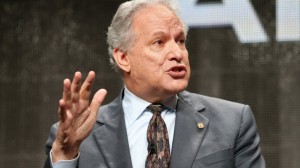Following a series of deadly safety scandals and, now, Volkswagen’s attempt to cheat on federal emissions standards, federal regulators will be a less tolerant of industry claims, especially when it comes to self-certified testing, warned the nation’s automotive chief.
“We’re questioning everything now,” said Mark Rosekind, director of the National Highway Traffic Safety Administration, during an appearance at an industry conference in the Detroit suburb of Novi. “You have to question all assumptions.”
Last Friday, the Environmental Protection Agency ordered the recall of 482,000 Volkswagen diesel-powered vehicles after learning the automaker had installed a so-called “defeat device” designed to meet emissions standards when undergoing standard testing procedures. But once on the road, the vehicles were able to produce as much as 40 times the legal limit of harmful emissions.
The intentional deception was only discovered after seven years when, ironically, a group, intending to show how clean modern diesels have become, used a non-standard testing procedure that didn’t trigger the software VW had installed. The automaker initially denied it, though CEO Martin Winterkorn has since acknowledged VW’s deception and pledged to resolve the problem.
(Click Here for the latest breaking news on the VW cheating scandal.)
But VW is just the latest automaker taken to task for concealing actions that violate safety and emissions laws. Earlier this month, General Motors agreed to a settlement with the U.S. Justice Department requiring it to pay a $900 million fine and go on three years probation for concealing an ignition switch defect now linked to more than 100 deaths. Fiat Chrysler paid a record fine to NHTSA for failing to live up to safety regulations on dozens of recalls. And in March 2014, Toyota paid a $1.2 billion fine to settle another Justice Dept. criminal investigation.
“You don’t have to say ‘was that a lie?’ You just have to challenge every assumption when information is provided,” said NHTSA’s Rosekind, during an appearance at a conference sponsored by the trade organization, the Auto Industry Action Group.
NHTSA itself came under intense fire for its failure to detect safety problems including the GM ignition switch issue and a problem with Takata airbag inflators that has forced the recall of nearly 30 million vehicles in the U.S. alone. Since taking over the helm at the federal safety agency last December, Rosekind has ordered a major shake-up at NHTSA to improve its regulatory oversight.
For his part, Rosekind has stressed on several occasions that he wants a more cooperative relationship, but one with zero tolerance for safety problems. A number of officials in the automotive business contacted by TheDetroitBureau.com said they expect to see significant changes in the way industry and government work together.
(GM CEO Barra claims maker has learned its costly lesson. Click Here for more.)
Among other things, the government may be less willing to readily accept the results of self-certification programs in which automakers are allowed to run their own tests to determine compliance with safety, emissions and fuel economy standards.
Korean carmaker Hyundai Kia, for one, paid a large fine – and hefty payouts to owners – several years ago when it acknowledged the fuel economy numbers its tests generated ran as much as 6 mpg higher than they should have been for a number of vehicles.
The challenge for the government agencies overseeing the auto industry will be to come up with the resources to either take over testing or find ways to validate industry numbers. The Republican Congress, while sharply criticizing NHTSA earlier this year, refused to provide additional funds, for one thing, to expand the agency’s Office of Defects Investigation.
Ford was later faulted for also overstating mileage. And that pattern repeats itself, industry officials note. Major problems often are not limited to the automaker that gets caught.
Already, several other automakers, such as Mercedes-Benz, are being questioned about how clean their diesels operate in the real world.
“Every time we have an individual automaker or supplier where we find an issue, your first question has to be how extensive is it through the whole industry?” Rosekind said. “If they did it anyone else can do it.”
Expect to see NHTSA, the EPA and other government agencies be a lot more suspicious about the data they’re given going forward.
(Hammered by biggest fed fine ever, Fiat Chrysler aims to fix safety program. Click Here for more.)



It seems to me if the EPA, NHTSA and other federal agencies who get handsome annual budgets were actually performing their jobs properly they would have discovered the recent ignition switch and emissions issues years ago.
How can NHTSA list the BMW X35i series of vehicles with high pressure fuel pump failures on the NHTSA website as a safety defect, with documented accidents and NOT force BMW to properly repair ALL of the cars sold? Instead NHTSA allowed BMW to extend the fuel pump warranty. How does an extended fuel pump warranty negate the liability experienced when the fuel pump fails with the vehicle in motion and the engine goes dead with no power steering assist? I’m certain that an extended warranty doesn’t fix a safety defect…
Jorge,
Recall that Congress got raging mad at NHTSA for not doing its job but when reminded they had eight staff to field, what, 80,000 complaints, (and similar shortages in other divisions), lawmakers said no. It’s magical thinking to believe that fed agencies can take on the rapid proliferation of products, the growth in complaints, etc., with current funding. The question is how will they be able to move away from self-certification. Will the industry be required to pay for having NHTSA and EPA, or perhaps third parties like IIHS and…?…do it independently?
Paul E.
NHTSA crack down?
In May, I complained about my 2015 Sonata’s uncontrollable sudden braking problem and no one there seemed to care?
Hi, Bernard,
See stories we posted over the summer about the overwhelming load of complaints NHTSA receives in a sorely understaffed, underfunded department. Additional funding has been denied so far. That said, complaints often are logged and lead investigators to take a closer look at a problem.
Paul E.
Agree with Paul. When we hear so much shrieking about “too much government, too much regulation”, it’s hard to imagine that the political climate will allow these agencies to get the necessary funding.
And the same people who say these things are the ones who tout “business experience” as a good qualification for office. I’d say we are seeing that large private organizations are just as capable of inefficiencies and blunders as any government, and several times more capable of outright lawbreaking (follow the money, not such an issue in government)
It’s been the case for decades that many U.S. government agencies are unaccountable, inefficient and often inept. They use budget restrictions as an excuse for their incompetence. The GAO has documented this many times. Now maybe these agencies will be forced to properly perform their responsibilities?